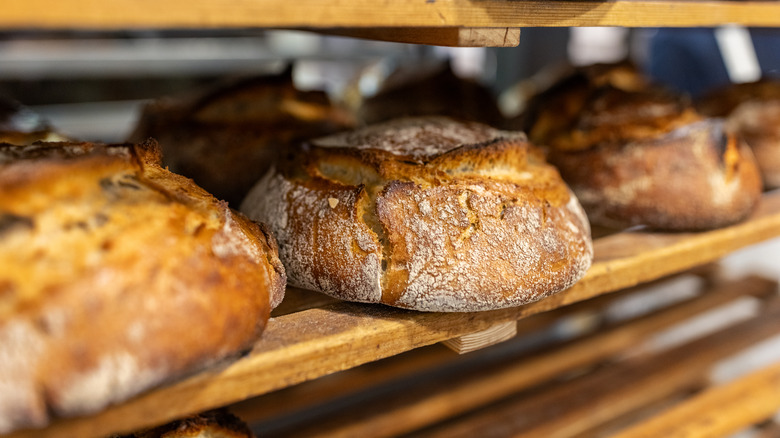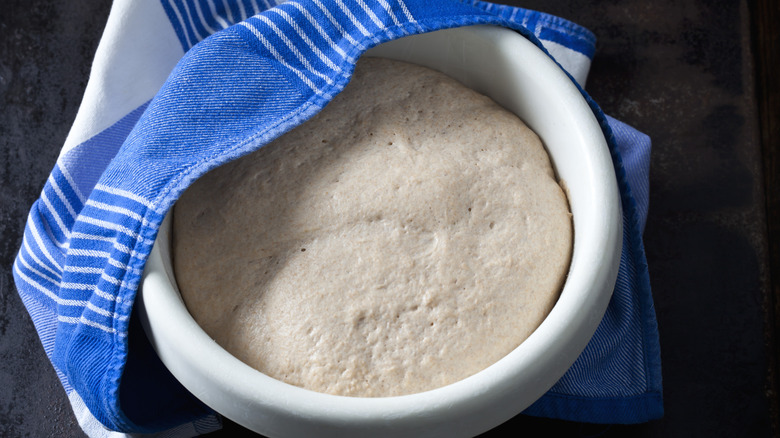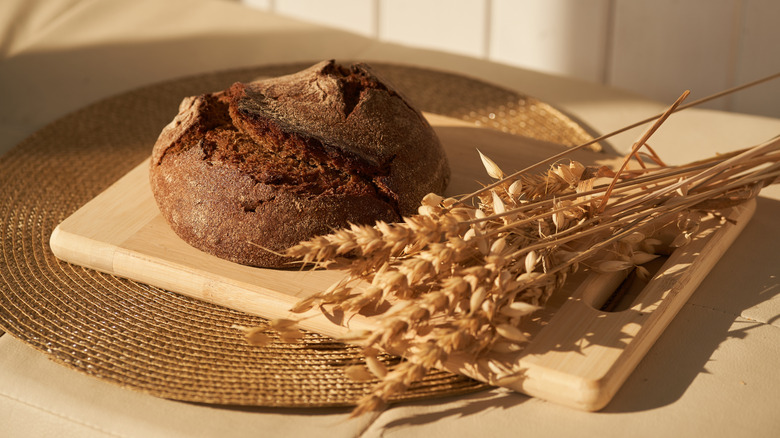The Best Type Of Flour To Use When Making Sourdough
When it comes to milestones for the aspiring at home baker, few can top the quintessential loaf of sourdough. It's a labor of love like few others in the baking playbook, requiring hours of careful kneading and resting, and enough patience and love to get a good homemade sourdough starter going. For all the complexity involved in making it, sourdough is a remarkably simple creation: In fact, all you need to make it is flour, water, and patience. Given that there are only two ingredients, you should probably make sure that the flour that you use is exactly right for what you're baking.
To find out a little more, Food Republic asked Sheena Otto, resident baker of Brooklyn's Park Slope Farmers Market. "It depends on what kind of sourdough bread you are looking to make," she told us. "A loaf with an open, irregular, translucent crumb would be best made with high-gluten, or 'bread' flour, because you can make a very high hydration dough, and the elasticity and extensibility of bread flour are unmatched and will give you the large air pockets that are currently 'in.'"
This is going to be the perfect flour to use if you're after that real artisan feel –- that beautiful cross-hatch scored, flour dusted loaf. Otto continued: "If you're looking more for sandwich bread, meaning a slightly tighter crumb so that your sandwich fillings don't spill out onto your fingers while you're eating, but you still want that chewy texture associated with crusty sourdough bread, all-purpose flour will be your best bet."
Good alternatives to AP flour when making sourdough
Though a strong bread or AP flour might be the best option for making a great loaf of sourdough, what if you've got a hankering for some baking, and no bread flour on hand? We asked head baker Sheena Otto for some recommendations when it comes to good alternatives to use. One such flour is made from Durum wheat, a robust grain that's often used to make high-quality pasta doughs. "Durum flour absorbs water differently, and requires much more water than bread or AP flour, but is less extensible than bread or AP flour (think of a balloon that is very difficult to inflate), and you can expect a softer, tighter crumb." With that tighter crumb, you'll get something more akin to sandwich bread — none of those classic air pockets in traditional sourdough — with a delicious aroma and flavor as well as a unique golden tint.
Ultimately, whatever flour you use will give you a different final result. Even other grains, like spelt, can be a great option, too. "Spelt flour is also high in protein, but does not produce an open crumb; it can be blended with AP or bread flour for a different flavor profile." It'll give you a great loaf, sure, but the crumb structure won't quite be right for, for example, a fresh, homemade bruschetta, which needs a slightly more open crumb structure.
Flour blends to use and ones to avoid
Why limit yourself to just one flour when you could use a blend to create a true "best of both" loaf of sourdough? Rye, for example, is not only a delicious option for a slightly brighter-tasting sourdough but is an ideal flour to use as a jumping-off point to experiment with blending. "Rye flour will produce a tighter, denser, tangier loaf," Sheena Otto told us -– but combining it with another flour can get you closer to that classic, artisan, sourdough look (and taste). "Blending it with a different flour can produce a more open crumb with a tangier flavor."
Though there's a brilliant range of options when it comes to flour alternatives when making sourdough –- there are perhaps some flours that should be avoided: those finer flours that are made for desserts, for example. "I do not recommend cake flour at all for sourdough bread. It is meant for delicate applications, like cakes and pastries, and I don't think it will be able to produce enough gluten to produce a properly leavened loaf," Otto explained. Because the flour is so refined, it's excellent for producing bakes with a really fine crumb, but it lacks the robustness needed to correctly produce sourdough, which needs a great deal of gluten in order to rise properly, as the fermentation process hinges on its breakdown – but this also means that, even if you start with a high-gluten flour, your resulting loaf will have low gluten levels.



